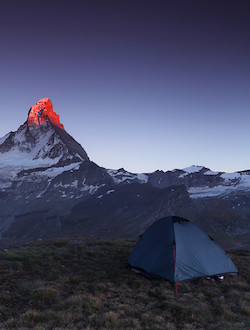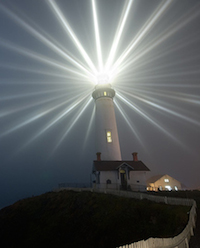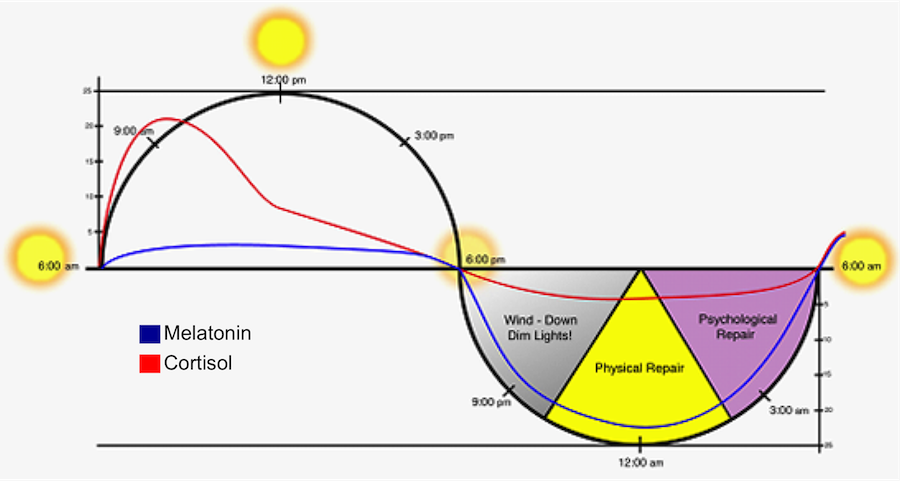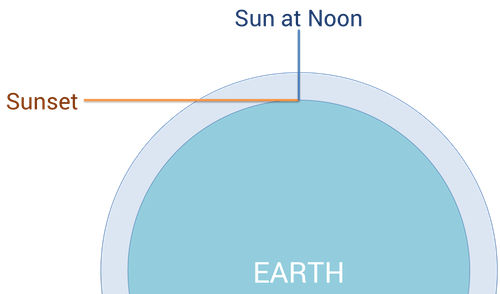 For most people, ergonomics starts and ends with weird office furniture. We’ve covered before why that is simply not enough. The Expanded Ergonomics Series explores a wide range of amazing applications for ergonomics.
For most people, ergonomics starts and ends with weird office furniture. We’ve covered before why that is simply not enough. The Expanded Ergonomics Series explores a wide range of amazing applications for ergonomics.
Have you ever noticed that going camping for a few days changes your sleep patterns/timing? We call that “resetting your circadian rhythm,” and it’s mostly due to changes in the light you experience. Camping exposes you to a natural light cycle that is sorely missing from average modern life.
Missing that natural light pattern is a big deal. It makes waking up harder, makes you less healthy, and might even be making you overweight. But there are cheap, easy solutions to get you on track.
Why Should I Care About Light?
Before we dive in to the fun narratives and scientific details, it’s important to understand just how critical this stuff is. Improper circadian rhythm doesn’t just make you feel tired in the morning and wired at night. It also significantly increases your risk of major disease and illness. Research has shown that an out-of-sync circadian rhythm:
- Increases heart-disease risk
- Increases obesity risk
- Increases depression risk
- Decreases energy
- Increases hunger and cravings
- Destroys libido
That’s all bad stuff that we want to prevent, obviously. And if you’re like the average American, your circadian rhythm is already out-of-sync. Let’s see why.
The Average Modern Light Cycle
Your alarm rings loud in your dark room. Dark because the sun hasn’t come up yet, or because your blinds are closed. You groggily rise and immediately flip a switch or open your blinds to flood your room with light.

Pictured: the average modern home at night.
After your morning routine, you get in your car and hit the highway to the office, likely with your windows rolled up. As soon as you swipe your key badge, you’re likely indoors until after sunset. Even if you’re lucky enough to make it home before dark, it’s unlikely that you’re outdoors during the western sky’s nightly picturesque watercolor display.
But you wouldn’t let a little thing like the sun being down keep you from seeing things! You spend the next few hours in your brightly lit house, likely looking at even brighter screens. Even after you climb into bed, you’re likely to leave the lamp on for another half hour – probably while staring at a phone screen or e-reader.
As you might imagine, your brain is wired to experience very different light exposure from that above.
The Natural Light Cycle
As the sun gradually peeks further over the horizon, the light around you goes from none to orange to white. The changing ambient light is sensed by your skin and eyes, triggering a suppression of melatonin (making you feel less sleepy) and an increase in cortisol (making you feel awake and alert). These changes cause you to wake up peacefully, and energetic for the day ahead.

The natural circadian rhythm of melatonin and cortisol (click image to enlarge) [img credit]
As the sun sets, the light changes again, now becoming less white and more orange. Your brain receives this signal, and in turn, suppresses cortisol and increase melatonin. Even if you have a fire, you begin feeling less alert and sleepier, because firelight is also very orange.
Get the Benefits of Natural Light without Living Outdoors
To sum up the above, we want black->orange->white light in the morning, and white->orange->black in the evening. As you may have guessed, you don’t need to trade in your house for a cave to achieve this. In fact, you can improve your sleep with simple adjustments to your day.
How to Optimize Your Mornings for Sleep
The best thing you can do is give yourself a natural sunrise. Thanks to modern technology, you can achieve this at any time of day! Simply get an electronic timer to switch your lamp on, and set it for 10 minutes before your alarm goes off. If you want to plop down some serious cash, there are lamps that will do the whole thing for you. We’ve also heard tell that Ergodriven is working on a fully-integrated (patent-pending) solution as well, and we’ll be sure to let you know when that’s available.
After you’re up, have a protein-rich breakfast (wakey, wakey, eggs and bakey!) followed by a few minutes of light exposure with no sunglasses or car windows in the way, to increase melatonin synthesis.

Sunset and sunrise are orange because the light travels further through the atmosphere to reach you.
How to Optimize Your Evenings for Sleep
The biggest problem at night is bright white light from lamps and screens, instead of the orange light you’re designed to experience. First, install F.lux on your computer. It tints your screen orange after sunset! Your house lighting, tv, and phone screen will still cause issues though. If you’re a bit of a tinkerer and have a Phillips Hue lightbulb, you can turn all your house lighting orange after sunset with IFTTT. You can even get an orange bulb for your bedroom lamp. The simplest solution is to wear blue-blocking glasses after sunset, but you’re going to look a little dorky.
The Bottom Line
Treating your body to the most natural light pattern possible will pay big dividends when it comes to your health, fitness, and happiness. Implementing all of the above suggestions will put you in a great place. At the very least, being aware of the behind-the-scenes magic in how our bodies respond to light will help you make wiser decisions in the future.
And now you can take time to watch beautiful sunrises and sunsets knowing that you’re improving yourself in the process!
Share this infographic on Facebook to help your friends improve themselves as well:
Have you tried anything to make the lighting in your environment more natural? Let us know in the comments.






This is the same thing I was talking about with blacking out my bedroom. It made me sleep so much better it was crazy.
I’ve heard Chris Kresser talk about protein rich breakfasts and morning light before, and I definitely knew about the light color stuff, but didn’t really think of it in a cycle like that.
I had no idea it had to do with the atmosphere like that. That picture totally made me understand sunrises! Thanks…
I blacked out my bedroom too but my sleep totally improved the most when I stopped watching tv after dinner. It was my wife’s idea originally and now when I break the rule to watch sports (go Giants!) I feel so much groggier the next day. And it’s not just sleeping less time… it’s like the tv hurts my sleep. I should get an orange tv!
Hey Hunter,
An orange television is a great idea! As an experiment, you could just put a sheet of orange acrylic over your tv to see how that changes things. We’d love to hear about it if you give it a shot.
Hunter,
I just heard that ergodriven is working on something here. We’ll be sure to let it be known once it’s ready, but you might want to join their newsletter just in case.
[…] why we’ve written about how light affects your sleep (even just flashes of light), and how to build an invincible circadian […]
[…] Note: posture is not the only thing you have to think about for optimal sleep. Light is hugely important too. (1,2) […]
Candlelight, fireplace, and salt lamps (orange light) are a regular in all the rooms of our house. We naturally gravitated to these for a variety of known reasons. Thanks for the information. It reinforces our current choices and will probably drive us to look for more ways to integrate more natural light choices into our lives. We homeschool. My son is a senior and is very interested in prevented healthcare, so I’ll definitely be sharing this series of blogs in our Anatomy & Physiology and Nutrition classes Thanks!! Good stuff…